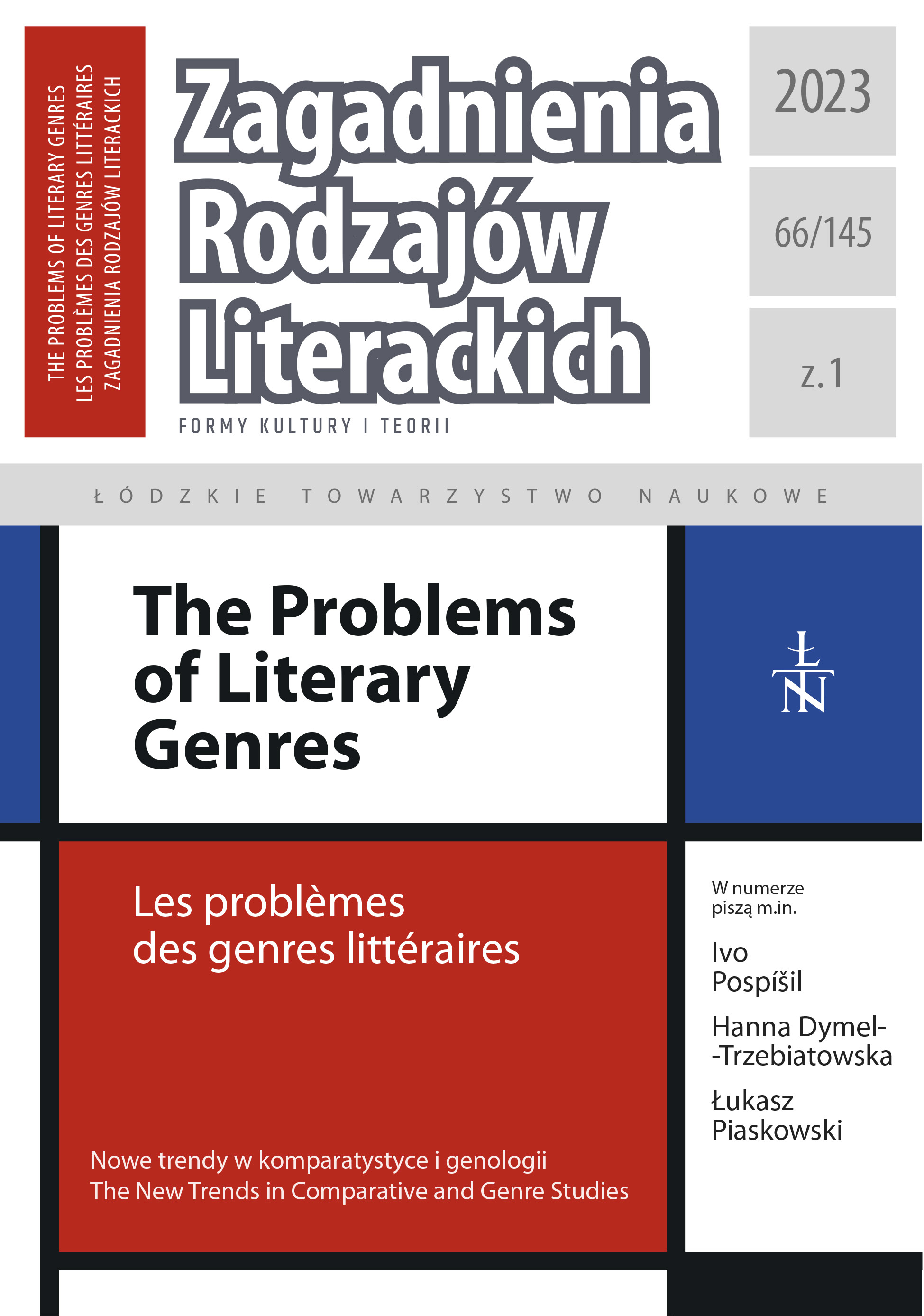The Meaning of Genre Studies in the Genre Situation of the 21st Century
DOI:
https://doi.org/10.26485/ZRL/2023/66.1/9Słowa kluczowe:
genre studies (genology); comparative studies; Paul Van Tieghem; Stefania Skwarczyńska; literary genres; spoken (oral) genresAbstrakt
Genre studies are an essential part of literary studies since they provide scholars and readers with a framework for analyzing and appreciating literary works. Genre studies are crucial (since the times of Paul Van Tieghem, the founder of genre studies) because they aid in the categorization and interpretation of texts, giving readers a road map to the text's meaning and purpose. They also had a significant impact on 20th-century literary movements, especially those that emphasized the aesthetics of communication and reception. Those 20th-century literary institutions, teams, and researchers who failed to recognize the importance of genre studies lost out on a golden chance to better comprehend the complexities and subtleties of literature. Literary studies are incomplete without the inclusion of genre studies, which serve as a foundation upon which to build a knowledge of and appreciation for literary works by both academics and general audiences. By publishing studies in professional journals and other specialist magazines, researchers may share their newest results and ideas with other academics in the area and participate in fruitful debate to advance genre studies. Projekt (from The Czech Academy of Sciences' — “The Genre Metamorphosis in a Central European Context”) initiative, which has been praised for its innovation and high-quality execution, has helped scholars see genres not as fixed classifications but as living, breathing systems and the link between art and society. The study of literary genres has historically concentrated on written or printed literature, but there is a rising interest in other types of literature, such as folklore and internet communication. Indicating the connection between literature and folklore, Ferdinand de Saussure's notions of lang and parole call attention to the presence of oral literary genres and, more recently, genres of technological (electronic) communication. Some forms of online communication have been compared to folklore and oral literature due to their collaborative and co-creative processes, which eschew individual authorship. This is a topic worthy of more investigation. Electronic communication genres have many similarities with folklore, including community authorship and a constantly changing, adaptable character. Because of its novelty and rapid development, this phenomenon is of great interest to literary and communication experts. To better comprehend texts, communication dynamics, social movements, and ultimately ourselves in the digital era, it is important that we share information about electronic communication genres and place greater attention on this issue in the academic setting, particularly in schools.
Liczba pobrań
Bibliografia
Gazda Grzegorz (2000), Słownik europejskich kierunków i grup literackich XX wieku, Wydawnictwo Naukowe PWN, Warszawa.
Genologia dzisiaj (2000), eds. W. Bolecki, I. Opacki, Instytut Badań Literackich PAN, Warszawa.
Genologia i konteksty (2000), ed. Cz. Dutka, Wyższa Szkoła Pedagogiczna im. Tadeusza Kotarbińskiego, Zielona Góra.
Hernadi Paul (1972), Beyond Genre: New Directions in Literary Classification, Cornell University Press, Ithaca–London.
Hunter Cornelius G. (2001), Darwin’s God: Evolution and the Problem of Evil, Eugene, Wipf and Stock Publishers, Oregon.
Lausberg Heinrich (2002), Retoryka literacka. Podstawy wiedzy o literaturze, trans. A. Gorzkowski, Homini, Bydgoszcz.
Le Goff Jacques (1998), Středověká imaginace, Nakladatelství Argo, Praha.
Levý Jiří, ed. (1971), Bude literární věda exaktní vědou?, Československý spisovatel, Praha.
Lichačov Dmitrij Sergejevič (1975), Poetika staroruské literatury, trans. L. Zadražil, Odeon, Praha.
Pavera Libor, Pospíšil Ivo (2004–2015), Žánrové metamorfózy v středoevropském kontextu, VII. sv., Istnis, Brno, Praha.
Pospíšil Ivo (1992), Rozpětí žá nru, Sprint Print, Brno.
Pospíšil Ivo (1998a), Genologie a proměny literatury, Masarykova univerzita, Brno.
Pospíšil Ivo (1998b), Ruský román: Nástin utváření žá nru do konce 19. století, Masarykova univerzita, Brno.
Pospíšil Ivo (2014), Literární genologie, Masarykova univerzita, Brno.
Remak Henry H.H. (2002), The Crisis of the Humanities in the United States [in:] Nadzieje i zagrożenia: Slawistyka i komparatystyka u progu nowego tysiąclecia, ed. E. Tokarz, Wydawnictwo Uniwersytetu Śląskiego, Katowice, p. 71–85.
Román a "genius loci": Regionalismus jako pojetí světa v evropské a americké literatuře [1992], Praha, sine.
Rose Michael R., Burke Molly K., Shahrestani Parvin, Mueller Laurence D. (2008), Evolution of ageing since Darwin, “Genet” no. 87, DOI: 10.1007/s12041-008-0059-6, p. 363–371.
Ruttkowski Wolfgang Victor (1968), Die literarischen Gattungen: Reflexionen über eine modifizierte Fundamentalpoetik, Francke Verlag, Bern.
Skwarczyńska Stefania (1959), Diskussionsbeitrag zu Problemen der genologischen Systematik, “Zagadnienia Rodzajów Literackich” vol. 2(2), p. 115–122, HANDLE: 11089/41445.
Skwarczyńska Stefania (1965), Wstęp do nauki o literaturze, PAX, Warszawa.
Słownik rodzajów i gatunków literackich (2012), ed. G. Gazda, II. ed., Wydawnictwo Naukowe PWN, Warszawa.
Theories of Literary Genres (1978), Pennsylvania State University, University Park–London.
van Tieghem Paul (1938), La Question des genres littéraires, “Helicon” vol. 1(1–3), p. 99–105.
Wollman Frank (1928), Slovesnost Slovanů, Vesmír, Praha.
Wollman Slavomír (1988), Porovnávacia metóda v literárnej vede, Tatran, Bratislava.
Wollman Slavomír (1989), Česká škola literární komparatistiky, Univerzita Karlova, Praha.
Zelenka Miloš (1999), Teorie manuskriptologie v postmoderní perspektivě [in:] Intertextualita v postmodernom umení, UKF, FF, Ústav literárnej a umeleckej komunikácie, Nitra, p. 61–72.
Zelenka Miloš (2000), Srovnávací literární věda z pohledu XIV. a XV. kongresu AILS (in margine problematiky) [in:] Literární věda na prahu 21. století — Nauka o literaturze u progu XXI stulecia, Slezska univerzita, Opava.
Ziomek Jerzy (2000), Retoryka opisowa, Zakład Narodowy im. Ossolińskich, Wrocław–Warszawa– Kraków.
Źródła wiedzy teoretycznoliterackiej w dawnej Polsce: Średniowiecze — Renesans — Barok (1999), eds. M. Cytowska, T. Michałowska, Wydawnictwo Naukowe PWN, Warszawa.
Pobrania
Opublikowane
Jak cytować
Numer
Dział
Licencja
Prawa autorskie (c) 2023 Łódzkie Towarzystwo Naukowe i autorzy

Utwór dostępny jest na licencji Creative Commons Uznanie autorstwa – Użycie niekomercyjne – Bez utworów zależnych 4.0 Międzynarodowe.







